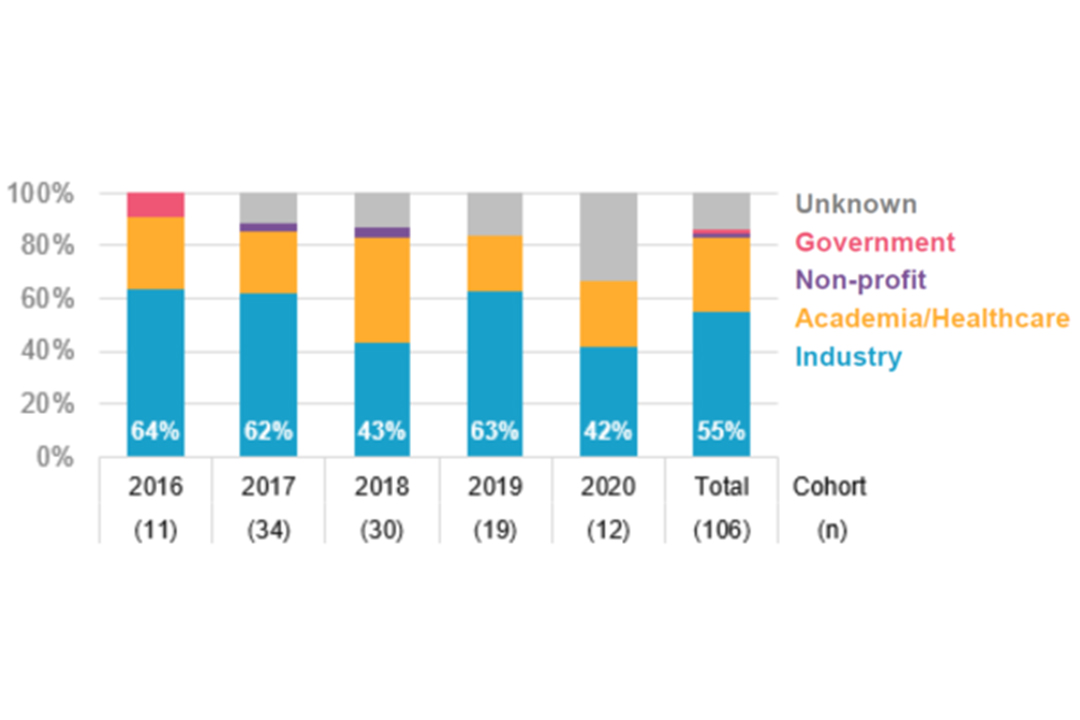“If you don’t want to be a university professor, why are you doing your PhD?” one of my peers asks innocently, already years into a cushy career. It’s common to ask the graduate students in your life what they plan to do when they graduate — and the options available to them are becoming more diverse. In recent years, a significant proportion of life science- and health-focused PhD graduates have decided to pursue a career outside of academia.
A graduate degree in life science provides students with a variety of skills, including project management, analytics, and oral and written communication — not to mention niche scientific expertise. However, it’s not easy to convince an employer that skills from five or more years of graduate school are transferable to their industry.
The Industry Team Case Study job simulation program
The Industry Team Case Study (ITCS) job simulation program, established by the Science Career Impact Project and the Life Sciences Career Development Society (LSCDS) at U of T, hopes to bridge the gap between life science graduate students and industry careers. The program has been running for five years and offers students the opportunity to build industry-relevant skills.
‘Industry’ refers to non-academic careers beyond tenure-track university positions. U of T’s 10,000 PhDs project found that in 2016, approximately 38 per cent of life science students who graduated between 2000–2015 had a position in industry careers, including the public, private, and non-profit sectors. Despite this high proportion, graduates face challenges entering the industry workforce due to skill gaps, poor self-marketing about their transferable skills, and ignorance about their career options.
The ITCS focuses on the biopharmaceutical sector. Trainees work with a team of like-minded peers at different stages of their graduate or post-doctoral career. Over four months, the teams identify a business or policy challenge, conduct research and analyses, develop a strategy, and finally present a solution to their industry mentors. These mentors are available to each team throughout the term to offer guidance.
Breaking into industry
Often, students keen to work in industry will seek out extracurricular experiential learning opportunities such as internships, job shadowing programs, and job simulations. Job simulation has trainees complete individual or group projects that mimic what professionals in their sector may experience. Unlike an internship, job simulation projects are completed in a non-employment context, but still provide opportunities for skill development and professional networking.
Of the 106 life science students that participated in ITCS between 2016–2020, 55 per cent were employed in an industry position after graduation. Historically, only 20 per cent of life science graduates were employed in private sector jobs. Importantly, just under half of ITCS trainees hired into industry jobs completed at least one internship in addition to the ITCS job simulation program. The program developers conclude that job simulation is an effective “alternative or companion” to other experiential learning opportunities and allows students to be competitive in the non-academic job market.
A preprint of an article written by a group of U of T professors indicates that ITCS alums report many benefits of participation in the job simulation program. Trainees obtain specialized knowledge and industry insights, build networking skills through engagement with mentors and peers, and diversify their job applications with a project portfolio. Being able to include ITCS projects in a portfolio, résumé, or cover letter also impresses hiring managers and helps alums stand out in their interviews.
Future sessions
Katelyn Kozma, one of the organizers of the ITCS program, and a group of her colleagues have recently published their process for initiating the ITCS job simulation program. The publication intends to guide other institutions, organizations, or even other graduate students to develop their own job simulation programs. The success of the ITCS job simulation program may mean expanded opportunities for life science research trainees.
Right now, current life science graduate students can apply for the 2022 ITCS. An information session will be held in December, with updates about the event released through the LSCDS mailing list. The LSCDS also offers other career events and mentorship with community professionals.
Graduate students in all areas can also access the Hart House Mentorship Program. This program pairs students with U of T alums or community members to facilitate career and personal growth.


